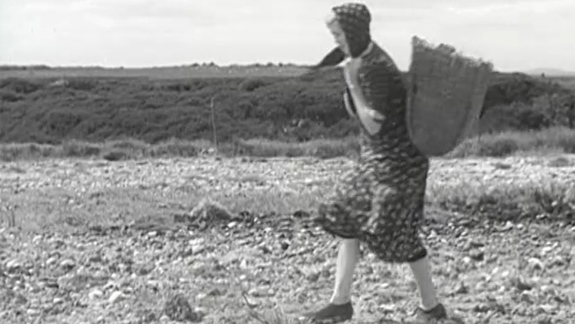Lewis Grassic Gibbon and 'Sunset Song'
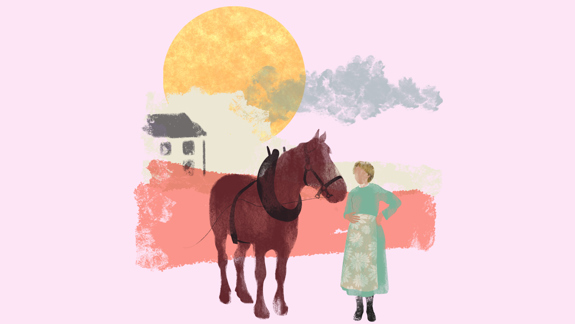
Introduction
When Lewis Grassic Gibbon's novel 'Sunset Song' was published in August 1932, a new Scottish literary star was born. The book was an instant critical and commercial success, which was reprinted multiple times in just a few months. Over 80 years later, it was voted Scotland’s favourite novel in a BBC poll. It is "without a shadow of a doubt" the favourite book of former First Minister of Scotland Nicola Sturgeon.
But what, exactly, made the work resonate and inspire, even years after it was written? We can find at least some of the answers by looking at Gibbon's own life and his earlier writing.
Who was Lewis Grassic Gibbon?
Lewis Grassic Gibbon was the pseudonym of Scottish writer James Leslie Mitchell. He was born on 13 February 1901 at Hillhead of Seggart in rural Aberdeenshire. Mitchell described his family as peasant farmers, who eked out a living there until 1907. When they lost the lease on their land, they were forced to move to a densely populated part of industrial Aberdeen. A year later they managed to get a croft in a part of Kincardineshire known as the Mearns.
Though the croft gave the family some security, they lived a precarious life. As a young boy, Mitchell could see the contrast between his own life, which depended on the vagaries of the elements, and the comfortable gentlemen farmers just down the hill, who owned larger tracts of higher quality land.
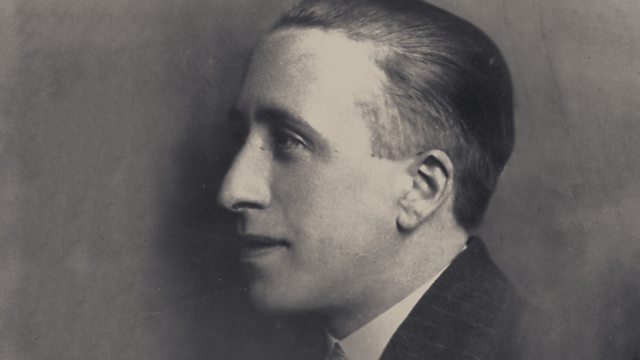
A budding reporter
Like the character Chris Guthrie in 'Sunset Song', Mitchell was self-taught in a range of disciplines. He read widely across literature, astronomy, philosophy and geography. Ancient history, anthropology and exploration became lifelong obsessions, which inspired his writing right up to his death.
In 1917, Mitchell rejected the life he was expected to follow. Wanting to see the world, and keen to write, he left the croft and joined the 'Aberdeen Journal' as a cub reporter. Amid revolutions and uprisings in Russia and Ireland, Mitchell quickly became politically active. He described himself as a Marxist with anarchist tendencies.
With a promotion to junior reporter for the 'Scottish Farmer', and a move to Glasgow, Mitchell's career looked like it was on the up. Until everything fell apart…
Military roles
In 1919, Mitchell was sacked for cheating on his expenses. The incident spelled the end of his journalistic career. The shame led to a breakdown. In a move likely driven by sheer desperation, Mitchell signed up to the Royal Army Service Corps for four years. His role working in logistics sent him to some of the distant lands he had read about as a boy, including Egypt and what was then Palestine. On these postings, Mitchell witnessed the brutalities of colonial rule.
When he returned to civilian life in the 1920s, Mitchell was unemployed and depressed. With few other options, he soon signed up for another military position. Committing himself to six years in the RAF, he began a clerical position in southern England.
Despite time pressure and the physical distance, Mitchell maintained links with the Mearns while working in the RAF. He occasionally visited family and friends and, in 1925, married Rebecca Middleton, known as Ray. She had been a near neighbour in Kincardineshire. He also found time to seriously pursue his long-held ambition to be a writer.
Mitchell and Ray's happy marriage was tinged with sadness after Ray lost a child very late in pregnancy and almost died herself. The impact of this trauma comes through in Mitchell's writing. Themes of troubled pregnancy and childbirth appeared in his first two novels and again in both 'Sunset Song' and 'Cloud Howe'.
Early writing success
His first book, a work of nonfiction, came out in 1928. Tapping into all the knowledge and ideas Mitchell had taught himself, 'Hanno, or The Future of Exploration' mixes ancient history, astronomy, anthropology, science and geography. It's a heady rush of a book that tells the story of our planet and man's exploration of it. The book finishes by imagining man's first landing on the Moon, which Mitchell correctly suggests will take place within 50 years. Like other popular nonfiction works of the period, including those by HG Wells, 'Hanno' was a success, selling over 1,000 copies in a year.
Failed novels
Two years later, Mitchell was a full-time writer living in Welwyn Garden City, a new town to the north of London. During a writing career of around six and half years, he published ten novels, along with short stories, books on exploration and reams of book reviews and essays.
Mitchell set his first novel, 'Stained Radiance: A Fictionalist's Prelude', mostly in the London he knew. However, one of the main characters came from the rural north-east of Scotland. A prototype version of 'Sunset Song's' Chris Guthrie, Thea Mayven disliked and rejected Scottish peasant life when it was her everyday reality. When transposed to London, though, she looks back on her past life fondly. Mayven's lover has much in common with Mitchell himself. He's a communist, an airman and an aspiring novelist trying to get by in 1920s London.
Poorly received by critics, 'Stained Radiance' sold few copies. Like many first novels it's awkwardly structured and overstuffed with ideas. However, the best parts showcase a talented stylist coming to terms with conflicting feelings about his childhood home. Mitchell wrote about these feelings in an original, evocative way.
In 1931, Mitchell followed this up with his second novel, 'The Thirteenth Disciple'. Like his first, it contains too many ideas, is structurally problematic, but has strong sections set in Scotland. Its narrator is a thinly veiled version of Mitchell, a man who becomes a journalist in Glasgow in the 1910s and witnesses the terrible living conditions of the poor in the city. He joins the fictional Left Communist Group and is even sacked from his newspaper for fiddling expenses. He joins the army, though earlier than Mitchell did, and serves in the trenches of the First World War. The vivid descriptions of life in the trenches remain one of the best fictional accounts of the First World War in Scottish literature.
Overall, 'The Thirteenth Disciple' is a major step forward from Mitchell's first. At the time, though, it was a miserable failure, selling even fewer copies than 'Stained Radiance'. Both are dark and intense, which might explain their failure to find an audience.
Forays into science fiction and adventure
Remarkably, Mitchell would publish another two novels within the following year. Each ventured into a new genre for him. And each was lighter than his previous works. The dedication page in 'Three Go Back' explains Mitchell's reasoning for a change of tack: "I wrote this book as a break from more serious things".
'Three Go Back' tells the story of an airship bound for North America that falls into a timeslip. The three passengers soon find themselves in the Stone Age, complete with a sabre-tooth tiger, a mammoth and an idealised portrait of early man. The novel became Mitchell's first commercial success.
Mitchell followed 'Three go Back' with 'The Lost Trumpet', an adventure story that reads like a prototype for the 'Indiana Jones' or 'Lara Croft' films. Set in Egypt, which Mitchell knew from his army service, the novel depicts a search for the legendary trumpet that brought down the walls of Jericho. Technically accomplished, it shows Mitchell in full command of his craft.
For his next book, Mitchell switched things up again. This time, he adopted the pen name Lewis Grassic Gibbon, a variant of the name of his maternal grandmother Lilias Grassick Gibbon. The book was 'Sunset Song'.
What is 'Sunset Song' about?
Gibbon’s best known novel tells the story of Chris Guthrie and her life on a farm in the fictional north-east Scotland town of Kinraddie. Like the Mearns on which it was based, in the early 20th century of the novel's setting, the isolated world of Kinraddie is influenced by outside forces like technological change and the First World War.
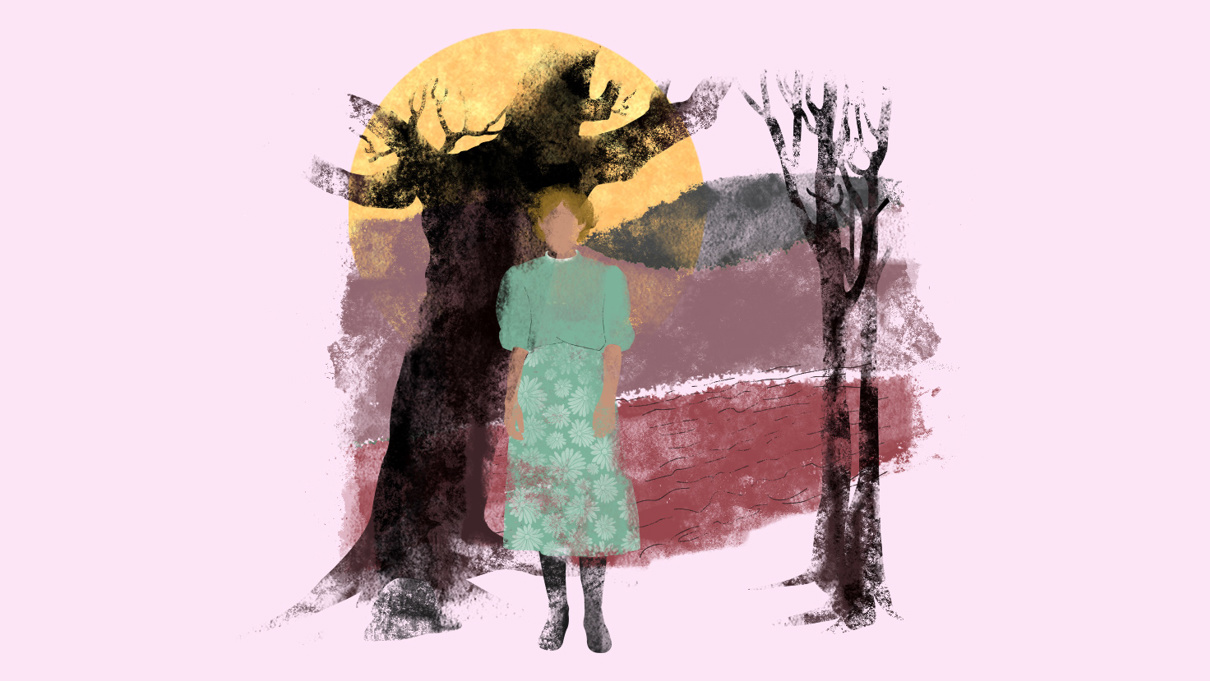
'Sunset Song' is a difficult book to characterise. It's a powerful fictional response to the First World War and its impact on a small rural community. It's a hymn to the natural beauties of the north-east, a tribute to its women and language and a lament for a way of life that was coming to an end. The novel presents a realistic account of rural life in Scotland, complete with deprivation and occasional brutalities. In fact, many readers reacted with disgust at the book's frank portrayal of sex and childbearing and the scorn it showed for the rich and powerful.
Looked at from the perspective of Mitchell's life and earlier writing, publishing 'Sunset Song' seems like a natural next step. At the start of the book, there's tension between the 'Scottish' side of Guthrie and the 'English' side. On the one hand, Guthrie is devoted to her culture and the "Scots words to tell to your heart". On the other, she longs for something more than the life she has. And she looks to education and the English language for that.
This dilemma between home and the wider world is a fictionalised version of struggles that lay at the centre of Mitchell's own life. After leaving Mearns at the age of 16, he never lived there again. Yet his childhood home retained a strong and increasing hold on his imagination. Through the character of Guthrie, it feels like Mitchell explored the world and life that he himself had left behind.
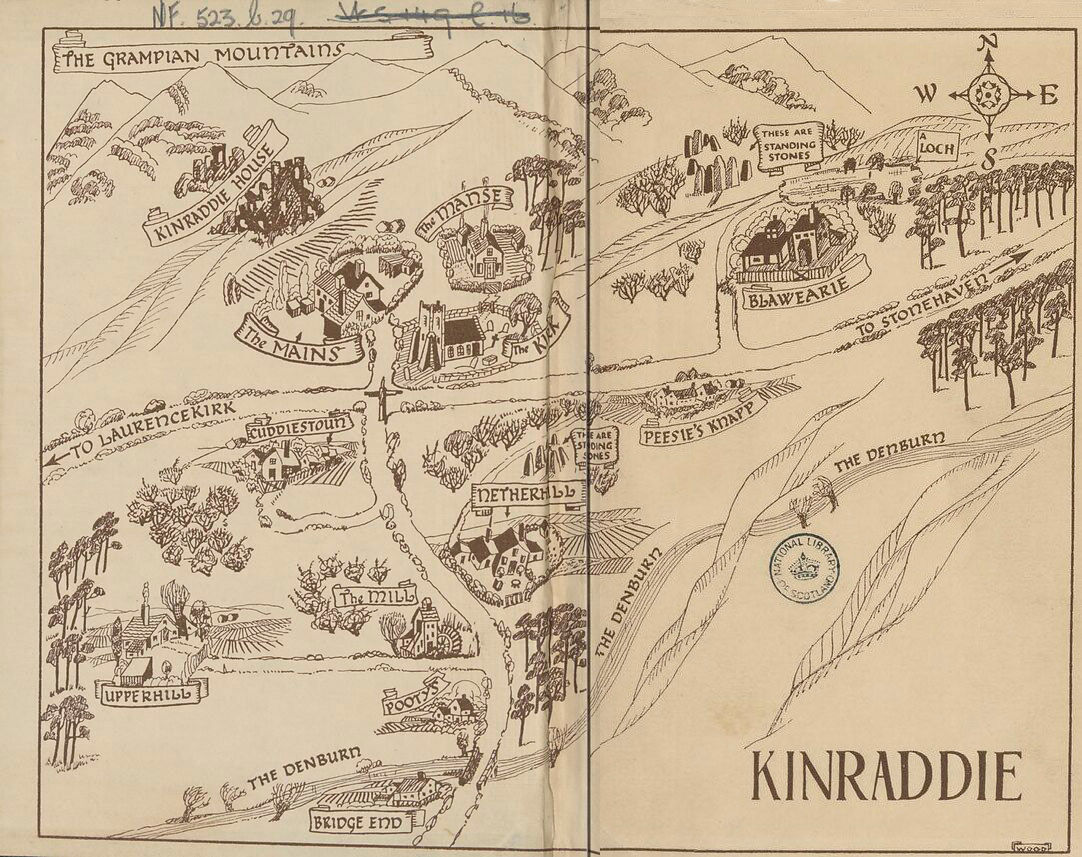
Above all else, 'Sunset Song' is the story of Guthrie's path through life, from wide-eyed adolescent to worldly-wise woman. As we follow her through love, marriage, childbirth and widowhood, she encompasses multiple identities. We see her as a daughter, a sister, a friend, a wife, a mother and a crofter.
The role of women in 'Sunset Song'
Throughout the novel, there's a weary acceptance by the women of 'Sunset Song' that men dictate much of their lives. That they must subordinate their own aspirations to those of the men in their family.
As the only daughter, Guthrie is expected to support her mother, look after her younger brothers and help her father run the farm. Despite these responsibilities, she exhibits quiet strength, resilience and an indomitable spirit.
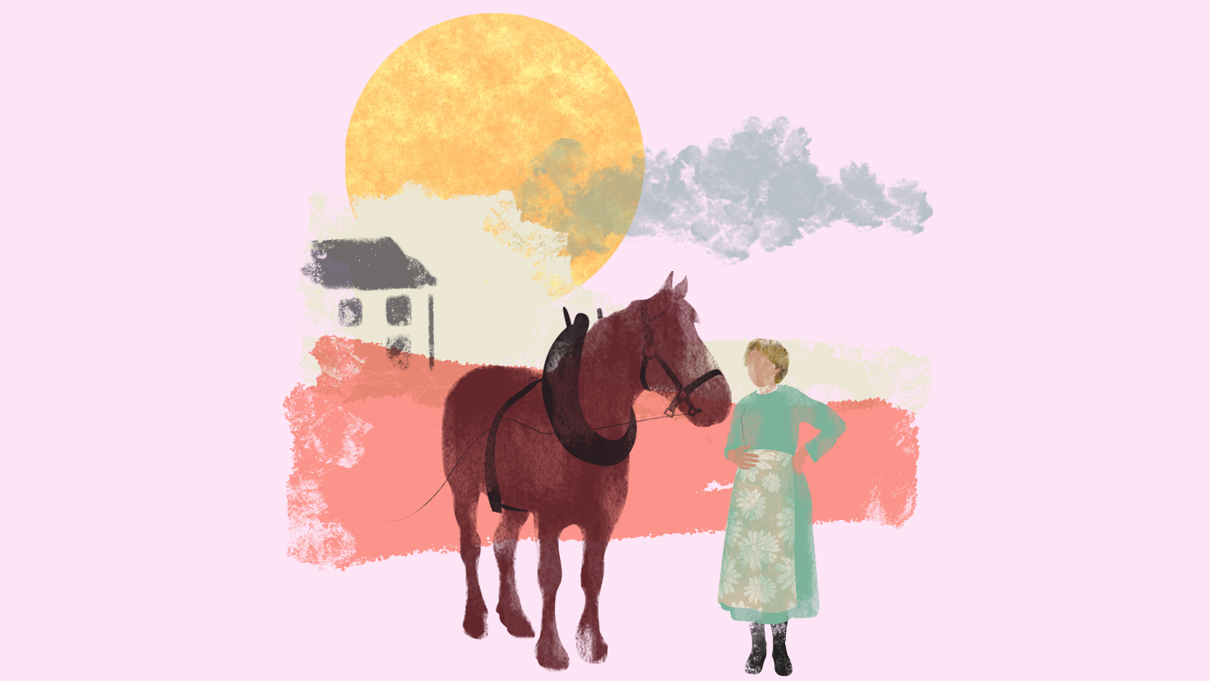
Guthrie's mother Jean, already a mother to four children, finds she is pregnant again. This gives us a stark reminder of how societal expectations were often detrimental to women's physical and mental wellbeing. At that moment, Jean is described as, "afraid with a fear dreadful". Her state of mind leads her to take her own life and the lives of her young twins.
Following her mother's tragic death, one of the townsfolk spells out exactly what's in store for Guthrie. Her words show that Guthrie's intelligence and thirst for knowledge are neither desirable nor necessary: "You'll be leaving the College now, I’ll warrant, education's dirt and you’re better clear of it. You’ll find little time for dreaming and dirt when you’re keeping the house at Blawearie".
Dutiful Guthrie does what's expected. She begins running the household in her mother's place. Like many women of her era, she suppresses her own desires and accepts the role society has thrust upon her. She therefore abandons her dreams of going to university and becoming a schoolteacher.
For Guthrie, the onset of womanhood wasn't a time for looking forward, making plans and following her dreams. Instead, it was a rude awakening to the reality that she must put all that behind her: "... and she knew for one wild passing moment herself both frightened and sorry she should be a woman, she’d never dream things again, she’d live them, the days of dreaming were by."
The impact of War
As the First World War marches on in the novel, the experience inextricably changes the fabric of Guthrie's community. Gibbon categorises people's responses as either "money mad" or "mad with grief".

For an agricultural community like Guthrie's, war and modernisation alienated the crofting class, who were left in the past. Asserting her own position and standing apart from other townspeople, Guthrie doesn't identify with this new world of loss or gain. Nor does she hold with the idea that money in itself can solve problems.
Towards the end of the novel, it's clear that Guthrie believes dying for 'King and Country' was akin to dying for nothing. Rather than embracing the patriotic fervour spreading across Britain, Guthrie instead sees herself belonging to the land and her community. She connects with these far more than with a remote, imperialistic mindset.
Attuned to the nuances of nature on the land and its people, Guthrie's innate connections gives her strength to withstand hardship. When her husband is away at war, Gibbon writes that Guthrie, "turned to the land, close to it, and the smell of it, kind and kind it was, it didn't rise up and torment your heart, you could keep peace with the land".
'Sunset Song' today
'Sunset Song' was followed by two sequels. 'Cloud Howe' published in 1933 and 'Grey Granite' in 1934. Each continues the story of Chris Guthrie and her family. The three novels are collectively known as 'A Scots Quair' ('quair' is the Scots word for book).
In all three books, Mitchell used the rhythms and cadences of Doric, the north-east Scots language, to capture the land and people of Kincardineshire. In doing so, he helped create a new tradition of Scottish writing, quite distinct from the English novel.
After 'Sunset Song', Mitchell used two concurrent writing identities. Works concerned with Scotland, like the sequels to 'Sunset Song' were published under the name Lewis Grassic Gibbon. Non-Scottish books were published under the name J Leslie Mitchell. These include the excellent 'Spartacus', about the gladiator who led a slave revolt, and another time-travel adventure, titled 'Gay Hunter'. Mitchell's final book to publish in his lifetime, 'Nine Against the Unknown', united his two writing identities. This 1934 collection of essays on explorers is co-credited to both J Leslie Mitchell and Lewis Grassic Gibbon.
On 4th January 1935, Mitchell had an operation for a perforated ulcer at the Queen Victoria Hospital, Welwyn Garden City. He died three days later, just a few weeks shy of his 34th birthday. After his body was cremated at Golders Green, Mitchell's wife Ray took his ashes back to Scotland, to be buried at the Mearns.
Though Mitchell's life and writing career were cut short, the novel 'Sunset Song' endures. This is, in part, because the tensions both author and main character wrestled with live on. As Nicola Sturgeon says of Guthrie, "she helped me make sense of the conflicts and choices my teenage self was grappling with. I understood through her the love / hate – but ultimately love – relationship with the land that many of us feel".
About the author
A member of our Published Collections team, Ian Scott is a Curator with a specialism in sport, leisure and newspapers.
Dive deeper
'Sunset Song' Quines Past and Present

The books of Lewis Grassic Gibbon
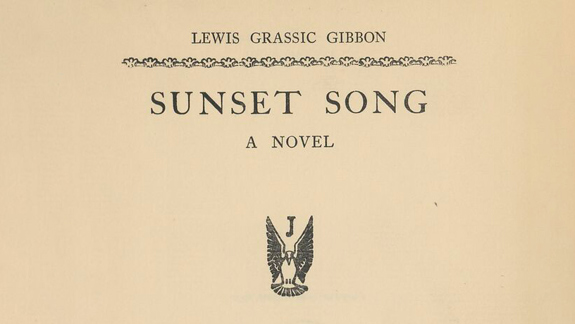
'They made the land'
